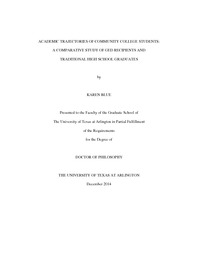
ATTENTION: The works hosted here are being migrated to a new repository that will consolidate resources, improve discoverability, and better show UTA's research impact on the global community. We will update authors as the migration progresses. Please see MavMatrix for more information.
Show simple item record
| dc.contributor.author | Blue, Karen Leigh | en_US |
| dc.date.accessioned | 2015-07-01T17:50:22Z | |
| dc.date.available | 2015-07-01T17:50:22Z | |
| dc.date.issued | 2014-12 | |
| dc.date.submitted | January 2014 | en_US |
| dc.identifier.other | DISS-12879 | en_US |
| dc.identifier.uri | http://hdl.handle.net/10106/24919 | |
| dc.description.abstract | The purpose of this study is to examine the effects of secondary education credential on the academic trajectories of community college students enrolled in courses and programs at a large urban community college in the Dallas/Fort Worth area. The study is based on the assumption that academic capital acquired at college level, and evident in student outcomes, is built on pre-college academic preparedness and affected by one's college trajectory, being qualified by student's demographic characteristics. The results indicate that GED recipients required more remedial coursework than high school graduates, especially in mathematics. In addition, the GED recipients were less likely to complete a program of study and earned a lower number of college credits than high school graduates. This study provides some answers about how GED recipients succeed in community colleges, but also demonstrates the need to conduct more research as to learn what are their needs and what are the appropriate and adequate support services to help these students complete degree programs. | en_US |
| dc.description.sponsorship | Trache, Maria | en_US |
| dc.language.iso | en | en_US |
| dc.publisher | Education | en_US |
| dc.title | Academic Trajectories Of Community College Students: A Comparative Study Of GED Recipients And Traditional High School Graduates | en_US |
| dc.type | Ph.D. | en_US |
| dc.contributor.committeeChair | Trache, Maria | en_US |
| dc.degree.department | Education | en_US |
| dc.degree.discipline | Education | en_US |
| dc.degree.grantor | University of Texas at Arlington | en_US |
| dc.degree.level | doctoral | en_US |
| dc.degree.name | Ph.D. | en_US |
Files in this item
- Name:
- Blue_uta_2502D_12879.pdf
- Size:
- 803.6Kb
- Format:
- PDF
This item appears in the following Collection(s)
Show simple item record


